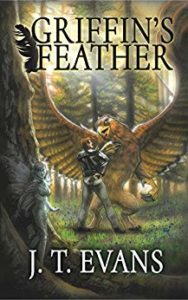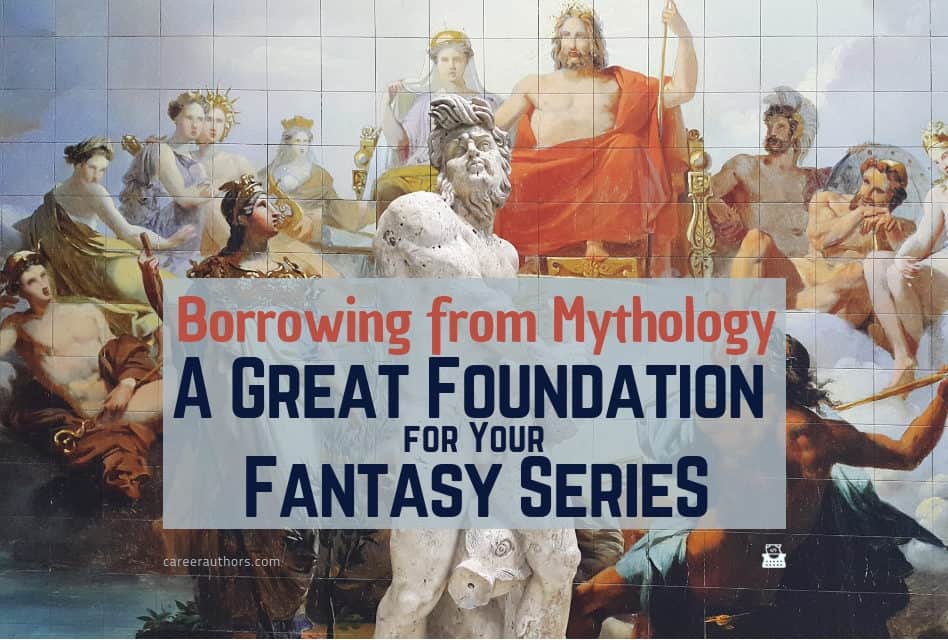by J.T. Evans
Many of today’s successful fantasy series, including Kevin Hearne’s Iron Druid series, Rick Riordan’s Percy Jackson books and Magnus Chase books, and my own Griffin’s Feather (to name but a few) have their roots in mythology. The world’s various mythologies offer great inspiration for creatures, magic systems, and deities for your novels.
My passion for mythology started at age ten when I delved into the world of role-playing games through the Dungeons & Dragons red box set. Fast forward a few decades, and I had an inspiration for an urban fantasy series about an immortal Roman centurion who works as a bounty hunter for the deities of the ancient world while living in modern-day San Antonio. I carefully chose these concepts and married them together in my debut novel, Griffin’s Feather.
I offer a few tips for those who want to mine the rich world of mythology for their fantasy series.
Honor the belief systems the myths arise from
These are (probably) not your deities, creatures, myths, and legends to appropriate and run amok with. What we call mythology was (or could still be) a set of religious practices diligently followed by a set of people. When appropriating a mythology, please keep this in mind and be respectful.
Research is key
Once you’ve decided to retell a story, use a deity, borrow a creature, or incorporate some ideal from a past mythos, there are several reputable resources available. I mainly use my collection of books, but there are websites that can guide and educate you. For example, Encyclopedia Mythica is a great resource for mythologies outside Greek, Roman, and Norse. And Wikipedia, a go-to site, has good overviews, but scroll to the bottom to get to the sources cited in the articles.
These 5 are my core books. (If I gave you a list of every book I have, you’d be reading just the list for hours.)
- Bulfinch’s Mythology
- Mythology by Edith Hamilton
- Mythology Visual Reference Guides by Dorling Kindersly
- World Mythology a Henry Holt Reference Book
- Funk & Wagnalls Standard Dictionary of Folklore, Mythology, and Legend by Maira Leach
Use more than one source of information
This will give you a more complete story. You may find that different sources disagree with one another. That’s because many of these tales come from pre-literate cultures. The stories were handed down orally over centuries. For good or ill, many of these mythological tales were originally transcribed and/or translated into the written form by traveling Europeans. They put their own spin or take on things as they wrote them down. I’m mainly thinking of the cultures of the Pacific Rim, Caribbean, Central/South America, and Africa when I make this statement. Since the conquerors write the history books, they’ve also codified these mythologies. This is where discrepancies can be found.
Resolve source discrepancies
Rectify differences in a way that works for your book and plot.
Where you find two sources disagreeing on a detail in mythology, seek a third (or fourth or fifth) resource and then make choices about which version to incorporate based on the needs of your story. In Griffin’s Feather, I used a Maori deity named Tawhaki. He’s a deity of lightning and thunder; however, some sources say he also caused a devastating flood. In one resource I found, he supposedly saved a village from a flood. When my protagonist learns of Tawhaki’s involvement in the plot, he doesn’t fully trust Tawhaki because he’s unsure about whether the god “caused” or “prevented” flooding.
And speaking of Maori deities . . .
Spurn the familiar
Don’t limit yourself to the familiar Greek & Roman mythologies.
Cultures around the world, from South America to Asia, from Africa to the Antipodes, have wondrous, sometimes overlapping mythologies.
It is fascinating to explore the full range of world legends, and “mix and match” when building a mythology for your fantasy series. Kevin Hearne does this to great effect.
Choose to be of a time … or not
Decide whether or not your mythological entities will be anachronistic in relation to the modern world, and be consistent.
If Nemesis (Greek goddess of retribution) were to drop into your hotel room today, would she wonder what a television is? Would she care? Or would she plop down on the bed to watch an episode of your favorite TV show with you? Both choices offer interesting story possibilities. Choose one and stick with it.
Abandon constraints
Don’t feel constrained by the myths you adapt.
You can change or fictionalize the myths you borrow; in fact, it’s good to put your own spin on them. Jim Butcher has done this well by shifting the mythos of the Wild Hunt from various European histories, and incorporating Saint Klaus (Santa Claus) into the Wild Hunt in his Dresden Files novels. He’s put his own spin on an ancient tale, but he did so with reverence and respect for the original materials.
You don’t need to reinvent the wheel when creating a mythology for your fantasy series. Investigate the world’s myth systems–you’ll find a treasure trove of stories to jumpstart your worldbuilding.

 J.T. Evans writes fantasy novels. He also dabbles with science fiction and horror short stories. He is the former president of Colorado Springs Fiction Writers Group and Pikes Peak Writers. When not writing, he develops interactive voice recognition systems at the Day Job, home brews great beers, spends time with his family, and plays way too many tabletop games. His debut urban fantasy novel, GRIFFIN’S FEATHER, was released in October of 2017.
J.T. Evans writes fantasy novels. He also dabbles with science fiction and horror short stories. He is the former president of Colorado Springs Fiction Writers Group and Pikes Peak Writers. When not writing, he develops interactive voice recognition systems at the Day Job, home brews great beers, spends time with his family, and plays way too many tabletop games. His debut urban fantasy novel, GRIFFIN’S FEATHER, was released in October of 2017.





